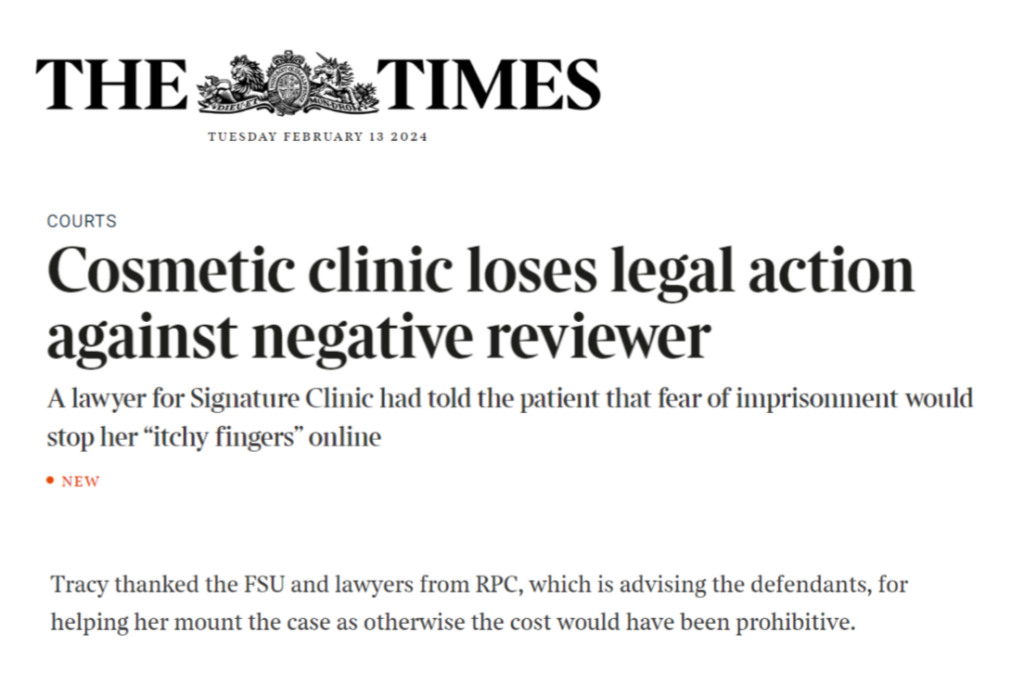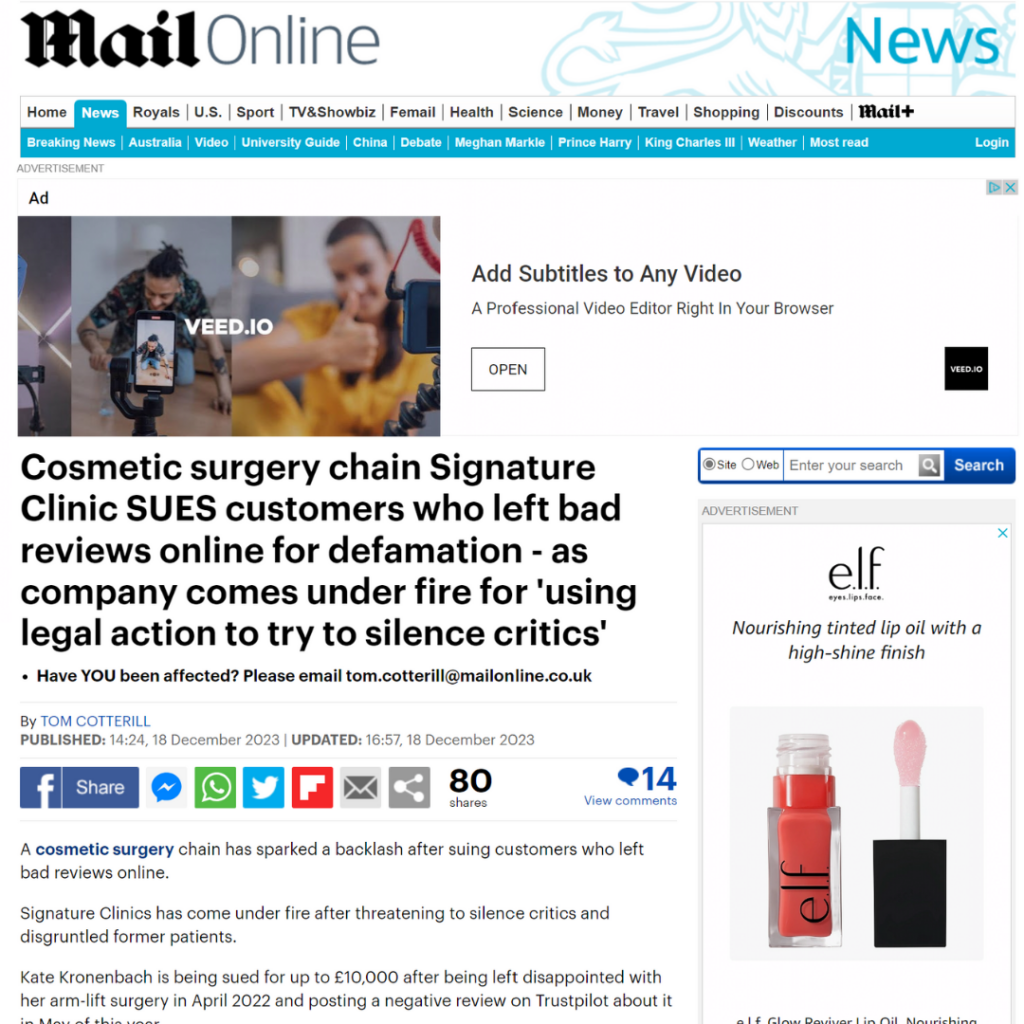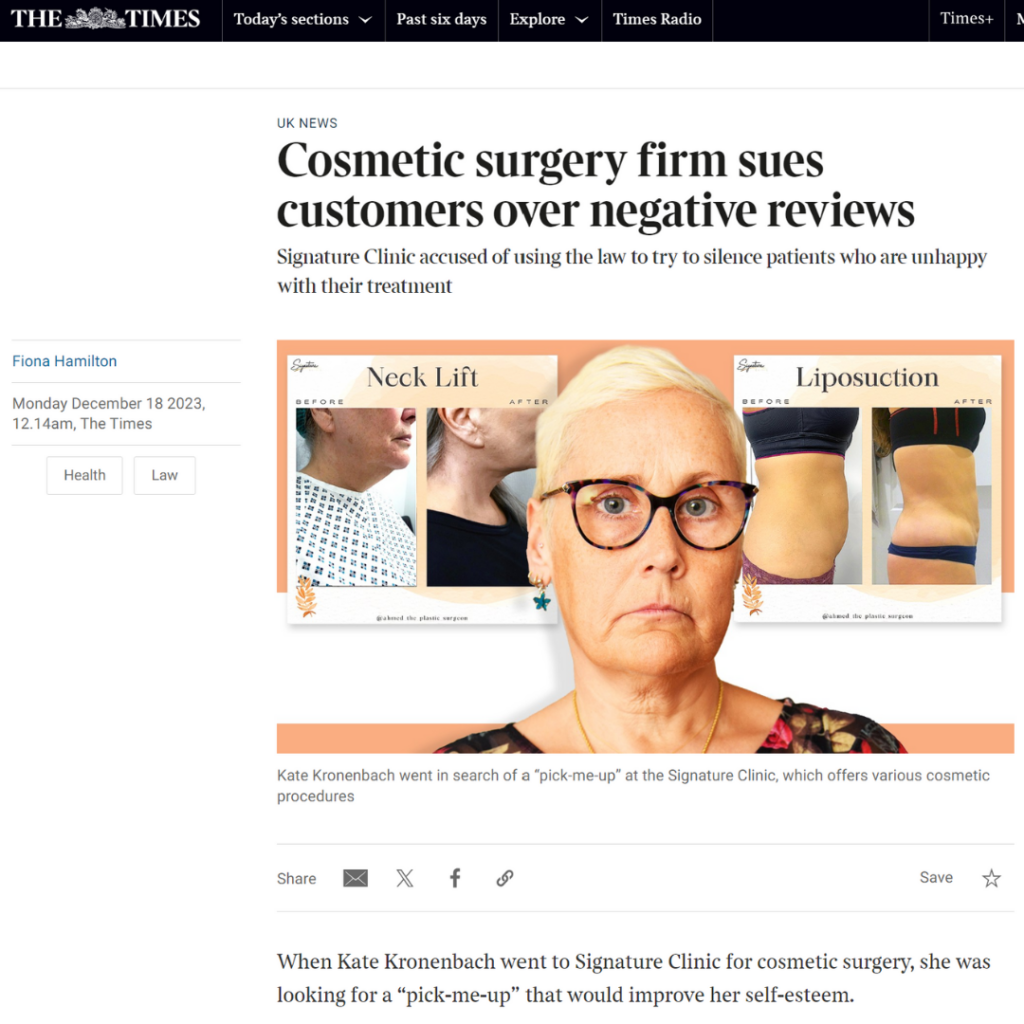It’s great to see BBC Woman’s Hour and the Times both reporting the heartening story of FSU member Tracy Holland, who took on a big corporation, and with our help has now won an important legal victory for free speech in our society’s burgeoning online review culture!

The FSU has been assisting a group of six people, including Tracy, who have been hit with legal claims from one of the UK’s largest cosmetic surgery chains, Signature Clinics, after independently posting honest but unfavourable comments about the company on various online support groups and review sites. Four of the six are facing defamation proceedings, and all have similar stories, while Tracy and another person have been accused of harassment. All but one of the group are former patients. (Our involvement in this case was first reported in the Mail, Times and on Times Radio.)


Tracy’s case is the first to be decided by the courts, and like every other member of the group, she accuses Signature of deploying an abusive litigation tactic designed to stifle free speech, known as ‘strategic lawsuits against public participation’ (SLAPPs).
The FSU believes this may well be an example of a SLAPP. This form of litigation is typically brought by large, well-financed claimants with the intention of harassing, intimidating and financially exhausting opponents – typically lone individuals – via improper use of the legal system.
In recent years, SLAPPs have become notorious after a series of actions against journalists designed to stifle free speech and suppress legitimate reporting. Worryingly, however, Signature Clinic’s use of lawsuits appear to be the first major attempt to use this mechanism to silence consumers who place unflattering reviews online.
Tracy’s ordeal began last February when she attended Signature’s Birmingham centre to undergo eye-surgery. Following her operation, Tracy felt she’d been left with disappointing results, and began expressing her concerns about the treatment she’d experienced in a Facebook support group for the particular type of procedure she’d undergone.
Despite posting about Signature Clinic in good faith, her actions landed her in court after the company accused her of harassment and threatened her with an injunction.
However, in a significant victory for free speech, a judge has now thrown out the application to gag Tracy, describing it as totally without merit.
Speaking to Woman’s Hour’s about her case, Tracy said that it wasn’t long after she started posting comments to the Facebook support group that the clinic contacted her via a solicitor. At first, she ignored the letter, and continued to post to the Facebook group. But the clinic then wrote again, this time to notify her it would be taking her to court over her unfavourable comments.
“I felt sick, it scared me,” she said. “I told him I would stop posting, [and that] I couldn’t afford to get solicitors to help me.”
Tracy’s offer was rebuffed, however, with Signature’s solicitor notifying her by email that the fear of imprisonment for breach of an injunction was the only way to stop what he described as her “itchy fingers”, and prevent any further reputational and financial harm to his client. “He threated me with imprisonment, he threatened me with bankruptcy as well, he threatened me that I may have to sell my home,” she said.
Tracy also described receiving another letter, this time from Signature’s Chief Medical Officer, Dr Nesi Bahar, in which she was told: “I possibly had psychological problems because of the number of times I was asking for advice on that Facebook group.” Dr Bahar also said that Tracy risked being ordered to pay five or six figures in legal costs if Signature were to succeed.
The judge threw the case out on two grounds.
The first is that there were no reasonable grounds to bring a claim of harassment against Tracy.
Harassment is essentially a criminal standard, which involves causing someone fear, alarm and distress. During the hearing, the judge was shown a number of posts which Tracy made in the Facebook support group while seeking support and documenting her concerns about her recovery, and concluded that they were nowhere near the threshold for consideration as ‘harassment’.
The second ground on which the case was thrown out is that it represents an abuse of process, using the court’s procedures and the law in a way that they are not intended to be used.
In reaching this conclusion, the judge referred to a number of communications sent by Signature’s solicitor, including the one in which Tracy was described as having “itchy fingers”. The fact that the company’s Chief Medical Officer, Dr Bahar, sent the letter in which Tracy was accused of having “psychological problems” was also found by the judge to be an aggravating factor in the abuse of process ground.
Having noted that the company’s actions were very likely to cause Tracy significant distress and upset, the judge then went even further, finding the company’s claim to be totally without merit – i.e., that its claim was bound to fail.
Of particular significance from a free speech perspective is that the judge noted how Tracy’s right to freedom of expression under Article 10 of the Human Rights Act (which protects a person’s right to hold their own opinions and to express them freely without interference) was engaged, and that there had been a wholesale failure on Signature’s part to acknowledge this fact.
Tracy’s solicitor, Megan Grew from Reynolds, Porter and Chamberlain (RPC) told Woman’s Hour that the case was “incredibly important” from a free speech perspective. “This is someone posting on a Facebook support group, and trying to seek support and document her recovery journey, and raise concerns about the treatment she’s had during a major medical procedure,” she said, adding: “I think if we lived in a world where companies could shut down any and all criticism and even people seeking support, I think that would be incredibly concerning.”
Speaking to the Times, Bryn Harris, the FSU’s chief counsel, said that the judge’s decision was “a very welcome vindication of our member’s right to freedom of speech”, adding: “This decision sends a very clear message to Signature Clinics, and all other litigants, that abusing the legal process to threaten customers into silence is wholly unacceptable. We hope the Solicitors Regulation Authority hears that message loud and clear.”
On the question of whether Tracy’s legal victory augurs well for the five other FSU members currently facing similar claims by Signature Clinic, Megan said: “I think it’s really encouraging that we’ve had this result in Tracy’s case, and it shows that the courts are willing to strike out claims that are made without merit and claims which potentially have the effect of silencing people’s freedom of expression.”
The FSU continues to assist the other five members of the group. But this kind of litigation is expensive. If you can, please consider donating to help the Signature Four continue their brave fight, and stand against the use of legal force to silence honest voices — the link to donate is below.
You can listen to the full BBC Woman’s Hour segment on Tracy’s legal case below.







